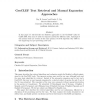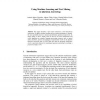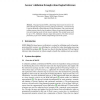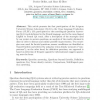CLEF
2006
Springer
14 years 3 months ago
2006
Springer
In this paper we will describe the Berkeley approaches to the GeoCLEF tasks for CLEF 2006. This year we used two separate systems for different tasks. Although of the systems both...
CLEF
2006
Springer
14 years 3 months ago
2006
Springer
Abstract. We promote the use of explicit medical knowledge to solve retrieval of information both visual and textual. For text, this knowledge is a set of concepts from a Meta-thes...
CLEF
2006
Springer
14 years 3 months ago
2006
Springer
This paper summarizes the task design for iCLEF 2006 (the CLEF interactive track). Compared to previous years, we have proposed a radically new task: searching images in a natural...
CLEF
2006
Springer
14 years 3 months ago
2006
Springer
This paper describes a QA system centered in a full data-driven architecture. It applies machine learning and text mining techniques to identify the most probable answers to factoi...
CLEF
2006
Springer
14 years 3 months ago
2006
Springer
CLEF
2006
Springer
14 years 3 months ago
2006
Springer
This paper presents the results of our initial experiments in the monolingual English, Spanish and Portuguese tasks and the Bilingual Spanish English, Spanish Portuguese, Englis...
CLEF
2006
Springer
14 years 3 months ago
2006
Springer
This paper presents our bilingual question-answering system MUSCLEF. We underline the difficulties encountered when shifting from a mono to a cross-lingual system, then we focus o...
CLEF
2006
Springer
14 years 3 months ago
2006
Springer
Abstract. The paper features MAVE, a knowledge-based system for answer validation through deep linguistic processing and logical inference. A relaxation loop is used to determine a...
CLEF
2006
Springer
14 years 3 months ago
2006
Springer
This article presents the first participation of the Avignon University Science Laboratory (LIA) to the Cross Language Evaluation Forum (CLEF). LIA participated to the monolingual ...
CLEF
2006
Springer
14 years 3 months ago
2006
Springer
This paper describes our experiments in Geographical Information Retrieval (GIR) in the context of our participation in the GeoCLEF 2006 Monolingual English task. The TALPGeoIR sy...




